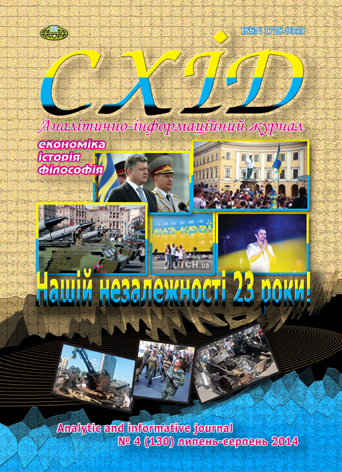The market condition of sanatoria and resort services in the coordinate system of the state regulated economy
DOI:
https://doi.org/10.21847/1728-9343.2014.4(130).26685Keywords:
state regulation of the economy, market conditions, sanatoria and resort services, consumer sovereigntyAbstract
While Ukraine is integrating into the European Economic Area the existing approaches to state regulation of sanatoria and resort services must be reviewed and improved as they should reflect socio-economic interests of the state and local communities in terms of renovation and sustainable development of resort areas and also create a favorable economic conjuncture - a situation that reveals the potential for the realization of market intentions of consumers (buyers) and suppliers (sellers) of sanatoria and resort services as well as reflects the efficiency of market institutions of which the state plays a leading role.
The paper is dedicated to the macroeconomic analysis of the activity of stakeholders in a sanatoria and resort market. It highlights the political and economy aspects of interaction in supply and demand for services of spa treatment and recreation of the population. The relevant range of forming favorable market conditions of sanatoria and resort services is considered basing on the analysis of a market management. The study has revealed the theoretical aspects of interaction between supply and demand in the market of spa services and development of terminological apparatus of a market interaction. Much attention is given to issues that are of a practical importance: the formation of effective demand and supply, mitigation of inequality in market conditions, establishment of economic equilibrium considering various needs and preferences of an individual, establishment of the primary rights of a consumer for services of sanatoria and resort treatment and recreation.
The global trends in market conditions of sanatoria and resort services should be taken into an account and be made the basis for developing and implementing a strategy of tourism and resorts development in a transition period, implementing well-balanced measures to modernize a sanatoria and resort market, reforming a health care system, recreating a human capital in Ukraine.
Downloads
References
1. Kalecki M. (1961), Political aspects of full employment, Ekonomista, № 5, pp. 1072-1076. (pol).
2. Keynes J. (2006), General theory of employment, interest and money, Atlantic Publishers & Dist, New Delhi, 400 p. (engl).
3. Kondratyev N. (2002), Large cycles conditions and the theory of prediction. Selected Works, Ekonomika, Moscow, 767 p. (rus).
4. Lassalle F. (1864), Mr. Bastiat-Schulze from Delitzsch, The economic Julian; Or, capital and labor, Verlag von Reinhold Schlingmann, Berlin, 269 p (deutch).
5. Marshall A. (2013), Principles of economics, Palgrave Macmillan, New York, Basingstoke, 731 p. (engl).
6. Paretto V. (1909), Manual of Political Economy, Giard et Briére, Paris, 695 p. (french).
7. Repke V. (1927), Сonjuncture, Moscow, 176 p. (rus).
8. Steuart J. (1767), An inquiry into the principles of political economy: being an essay on the science of domestic policy in free nations, Miller&Cadell, London, Vol. 1, 687 p. (engl).
9. Tuhan-Baranovskyi M. (1906), Modern socialism in its historical development, St. Petersburg, 260 p. (rus).
10. Heiets V. (2009), Society, government, economy: phenomenology interaction and development, The National Academy of Sciences of Ukraine, Institute of Economic and Forecasting, Kyiv, 863 p. (ukr).
11. Mazaraki A. (2002), The domestic market as the basis for economic growth, Bulletin of the Institute of Economic and Forecasting, № 2, pp. 10-16 (ukr).
12. Lahutin V. (2008), The domestic market of consumer goods: theory of development and regulation, Kyiv National University of Trade and Economics, Kyiv, 327 p. (ukr).
13. Melnychenko S. (2013), Health resort enterprises: between stagnation and modernization, Herald of KNUTE, № 6, pp. 57-67 (engl).
14. Mykhailichenko H. (2012), Innovative tourism development, Kyiv National University of Trade and Economics, Kyiv, 608 p. (ukr).
15. Tsokhla S. (2008), The transformation of recreational activity and the development of regional markets resort and recreational services (methodology, analysis and ways to improve), Tavriia, Simferopol, 352 p. (ukr).
16. Say J-B. (2008), A Treatise on Political Economy, Ludwig von Mises Institute, Auburn, 488 p. (engl).
17. Mochernyi S. (ed.) (2001), Economic Encyclopedia in three volumes, Akademiia, Kyiv, Vol. 2, 848 p. (ukr).
18. Dzhevonsъ V. (1905), The Political Economy, Narodnaya polza, St. Petersburg, 120 p. (rus).
19. Bem-Baverk О. (2010), Vol. 1. Capital and profits; Vol. 2: Positive Theory of Capital; Vol. 3: Excursions, Chelyabinsk, 916 p. (rus).
20. Shumpeter J. (1982), Theory of Economic Development Progress, Moscow, 455 p. (rus).
21. Valras L. (2000), Elements of pure political economy, Izograf, Moscow, 448 p. (rus).
22. Galbraith J. (1998), The affluent society, Houghton Mifflin, Boston, 276 p. (engl).
23. Hutt W. (1990), Economist and the public: a study of competition and opinion, Transaction Publishers, Rutgers-The State University, NJ, Piscataway, 377 p. (engl).
24. Rothbard M. (2009), Man, Economy, State with Power and Market, Ludwig von Mises Institute, Auburn, 1441 p. (engl).
Downloads
Published
How to Cite
Issue
Section
License
Copyright (c) 2014 Volodymyr Gumeniuk

This work is licensed under a Creative Commons Attribution-NonCommercial-NoDerivatives 4.0 International License.
1. Authors bear responsibility for the accuracy of facts, quotations, numbers and names used.
2. Manuscripts are not sent back.
3. The publisher does not always agree with the authors' opinion.
4. The authors reserve the right to authorship of the work and pass the first publication right of this work to the journal under the terms of a Creative Commons Attribution-NonCommercial-NoDerivatives 4.0 International License. This license allows others to distribute (copy) the published work for non-commercial purposes, provided there is mandatory attribution to its authors and a link to the first publication in our journal.
5. The authors have the right to conclude separate supplement agreements that relate to non-exclusive work distribution in the form in which it has been published by the journal (for example, to upload the work to the online storage of the journal or publish it as part of a monograph), provided that the reference to the first publication of the work in this journal is included.

